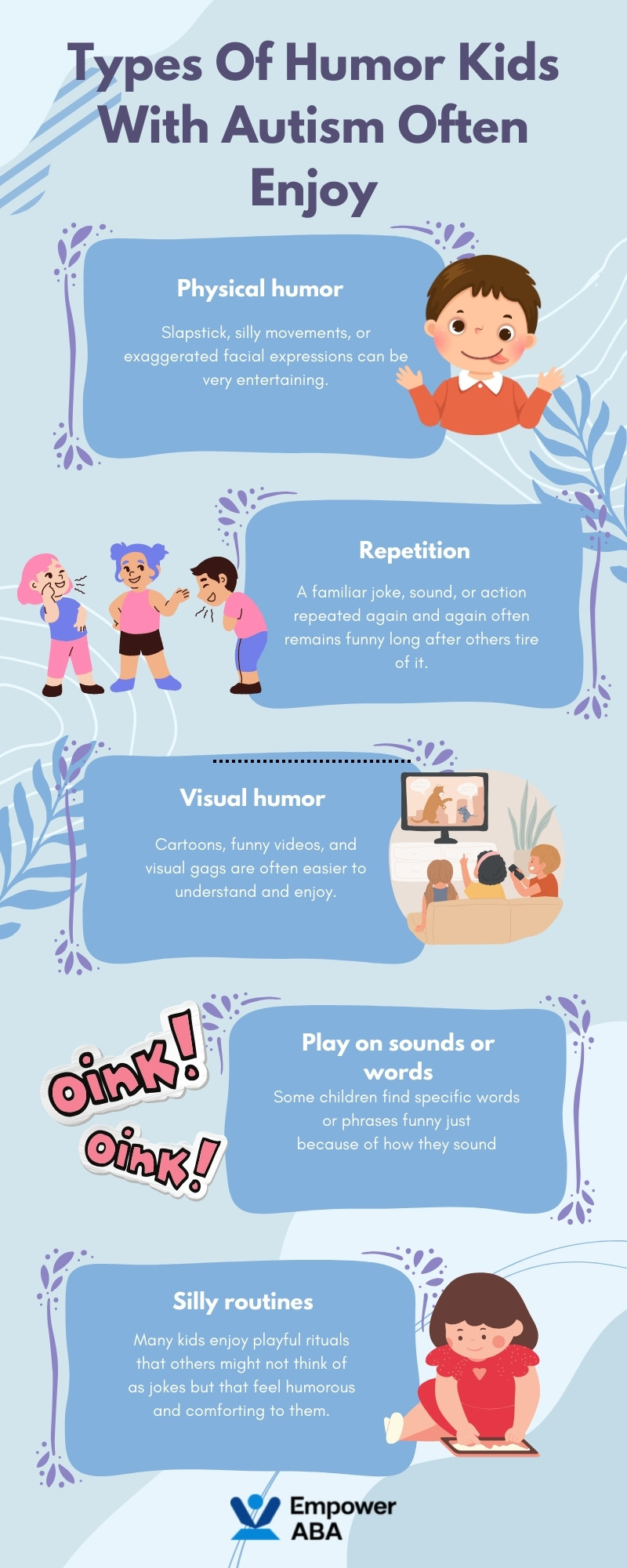Key Points:
- Children with autism do experience humor and laughter, though it may look different from what parents expect.
- Understanding autism humor helps strengthen bonds and supports social development.
- Parents can use practical strategies to nurture their child’s sense of humor and enjoy shared moments of joy.
When a child giggles, it lights up the room. Parents of children with autism often wonder about humor and laughter—why their child might laugh at something unexpected, or not seem to find “funny” things amusing at all.
Humor can feel like a mysterious puzzle when autism is part of the picture. The good news? With understanding and patience, autism humor can become a powerful way to connect with an autistic child and help them thrive. Below, we explore how humor works in autism, why it can look unique, and what parents can do to embrace those joyful moments.
Do Kids With Autism Understand Humor?
Yes, but it may look different. Children on the autism spectrum absolutely can have a sense of humor, but it may not always match what others expect. Many children with autism laugh in situations that seem random to others.
They may enjoy slapstick comedy, repetitive jokes, or certain words or sounds that others don’t find funny. This doesn’t mean they lack a sense of humor—it just means their humor develops differently and reflects how they perceive the world.
Research shows that children with autism often enjoy humor that is visual or physical (like funny faces or pratfalls) rather than verbal jokes or sarcasm, which require interpreting social cues. Understanding this is crucial. Autism humor is real, and learning to recognize what delights a child helps parents strengthen connection and communication.
Why Does Humor Look Different in Autism?
Autism affects how children process social and emotional information. Humor, especially social humor, often involves understanding someone else’s intentions, feelings, and subtle cues—skills that can be more challenging for kids on the spectrum.
Some children may laugh when feeling nervous or overstimulated, rather than because something is funny in the usual sense. Others may develop a fascination with specific words, sounds, or actions, finding them hilarious over and over again. This is because their sensory and cognitive experiences of the world are unique.
Recognizing that these differences are not “wrong” but simply another way of experiencing joy can help parents respond with empathy and curiosity.
Types of Humor Kids With Autism Often Enjoy
Parents often notice that their child gravitates toward certain types of humor while ignoring or even appearing confused by others. Knowing what kinds of humor tend to resonate with children on the spectrum can help foster laughter and bonding.
Here are some types of humor many kids with autism appreciate:
 How Parents Can Encourage Humor
How Parents Can Encourage Humor
Helping a child develop and enjoy humor is not just about laughter—it also builds social skills, emotional resilience, and family connection. Here are some practical strategies parents can use to support and enjoy autism humor:
- Observe and learn: Pay attention to what makes your child laugh. Notice patterns and incorporate them into play.
- Model laughter: Show your own joy and laugh at silly things together to demonstrate that humor is safe and shared.
- Use visual aids: If your child responds better to pictures or videos, use them to introduce funny situations.
- Keep it simple: Start with humor that is easy to understand—like tickling games, peek-a-boo, or funny faces.
- Be patient: If your child doesn’t find something funny, don’t force it. Their sense of humor will grow at their own pace.
- Encourage sharing: Help your child learn to tell their own jokes or share what they find funny, even if it seems unconventional.
When Laughter Seems Out Of Place
Parents sometimes worry when a child laughs at inappropriate times—like when someone is upset or during quiet moments. It’s important to remember that this kind of laughter is often a way for children with autism to cope with stress, confusion, or sensory overload.
If inappropriate laughter becomes disruptive or seems tied to anxiety, it may help to:
- Identify triggers by noting what happened before the laughter.
- Offer calming activities or a quiet space if they seem overstimulated.
- Teach appropriate responses gently and without punishment.
Laughter that seems “out of place” is usually not misbehavior—it’s communication. Listening and observing can help uncover what the child is feeling and why.
Why Humor Matters In Autism
Humor is more than just fun. For children with autism, humor can:
- Strengthen bonds with family and peers.
- Build confidence and help navigate social situations.
- Provide a healthy way to relieve stress and express emotions.
- Support language development when jokes and wordplay are practiced.
By celebrating autism humor and meeting a child where they are, parents can nurture joy, trust, and growth in their child’s unique way.
Supporting Humor Through ABA Therapy
Applied Behavior Analysis (ABA) therapy can also help children with autism develop social and emotional skills—including understanding and sharing humor. ABA therapists often use play, modeling, and reinforcement to teach children how to recognize emotions, respond appropriately, and enjoy playful interactions with others.
When integrated thoughtfully, ABA therapy supports not just skill-building but also the emotional connection and laughter that make relationships meaningful.
Discover How ABA Therapy Can Bring More Joy To Your Family
At Empower ABA, we believe every child deserves to experience joy, laughter, and connection. Our team specializes in ABA therapy in New York, New Jersey, and Virginia, offering personalized programs that meet your child’s unique needs—including supporting social skills, emotional development, and moments of humor that strengthen bonds.
If you’d like to learn how ABA therapy can help your child grow while celebrating their individuality, contact us today! We’re here to walk this journey with you and your family.

